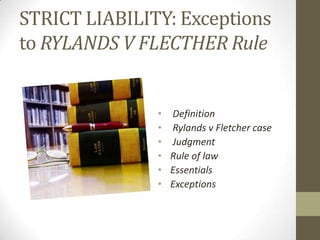
Strict liability
- 1. STRICT LIABILITY: Exceptions to RYLANDS V FLECTHER Rule • Definition • Rylands v Fletcher case • Judgment • Rule of law • Essentials • Exceptions
- 2. STRICT LIABILITY • A person may be liable for some harm even though he is not negligent in causing the same or does not intentionally cause it or is careful or has taken steps to prevent the same. • eg., The defendant is liable to the neighbor for emission of harmful gases with offensive smell from his big ore melting furnace, or constructing a dam which diverted water from its natural channel on the land of the neighbour. Such liability is called Strict Liability.
- 3. RYLANDS V FLETCHER • Facts : Plaintiff owned and operated a mine adjacent to which Defendant constructed an artificial reservoir. The latter caused a mineshaft collapse, which resulted in a flood, and damaged Plaintiff’s operation. The plaintiff sued, the matter was brought before an arbitrator to independently establish facts. The trial court found for Plaintiff; the appellate court affirmed; Defendant appealed to the House of Lords, which also affirmed.
- 5. JUDGEMENT • The court of Exchequer dismissed the claim stating that there is no valid case. • The court of Exchequer chamber again overruled the judgment in the favor of the Plaintiff and the judgment was announced by Blackburn J. on the behalf of all the six judges and gave the rule of strict liability. “The person who, for his own purpose , brings on his land and collects and keeps there anything likely to do mischief if it escapes, must keep it in at his peril ; and if he does not do so is prima facie answerable for all damage which is the natural consequence of it’s escape”. • Rylands was not satisfied with this decision and appealed in the House of lords and the appeal was again overruled by Lord Crains, he agreed to the decision of Blackburn J, and added a condition that the land from which escape has occurred must have been used in a NON-NATURAL, inappropriate or unusual manner.
- 6. The Rule Of Law “The person who, for his own purpose , brings on his land and collects and keeps there anything likely to do mischief if it escapes, must keep it in at his peril ; and if he does not do so is prima facie answerable for all damage which is the natural consequence of it’s escape”.
- 7. ESSENTIALS 1. Some Inherently dangerous thing must have been bought by the person oh his land. 2. That thing must ESCAPE from the land. 3. It must be a NON-NATURAL use of land.
- 8. EXCEPTIONS Act of Plaintiff’s Own Consent Act of Statutory God of the 3rd Party Fault Authority Plaintiff
- 9. Act of God • Act of god is a direct , sudden, irresistible , violent act of nature as could not by any amount of foresight have been foreseen or, if foreseen, could not by any amount of human care and skill have been resisted. • Example : Storm , Lightning , Tempest , Extraordinary fall or rain, Extraordinary high tide and Extra ordinary severe frost.
- 10. Act of 3rd Party • If the defendant is taking reasonable care and is maintaing it with the utmost care and if the escape of the dangerous substance, is due to a wrongful act of Third party/Stranger then the rule does not apply. • The Plaintiff cannot claim for damages where the act is done by a stranger, i.e., one who is neither defendant’s servant nor the defendant has any control over him. • In Box v Jubb , the reservoir was overflowed because a third party supplied a huge amount of water that drained down and damaged the plaintiff.
- 11. Plaintiff’s own Fault • Plaintiff’s own fault is another exception to the rule of Rylands v Fletcher, if the damage has been done by the act of the plaintiff himself, then the rule does not hold. • The plaintiff cannot claim for the damages for his own wrongful act. • In Ponting v Noakes , The plaintiff’s horse nibbled some poisonous tree by crossing the defendant’s boundary and died. It was held that the defendant is not liable, as it was horse’s own fault by intruding into the defendant’s land and, alternatively there, was no escape of the dangerous substance.
- 12. Statutory Authority • If the act is done under the state’s authority then the defendant can not be held liable • No action will lie against the act which has been authorized by the legislature, if it is done without negligence. • In Green v Chelsea waterworks co , a main belonging to the waterworks company , authorized by the Parliament, there was no negligence on the part of the company. A water main burst causing damage to plaintiff’s land. It was held that the waterworks company was in a statutory obligation to give high pressure water supply. They were not held liable.
- 13. Consent of the Plaintiff • If the plaintiff has directly or impliedly consented to the presence of the source of danger and there has been no negligence on the part of the defendant, the defendant is not liable. • The plaintiff cannot claim for damages if the plaintiff has consented to the presence of the dangerous thing. • A manufactured explosives on his land, B got some commission from A, Explosion in the Factory B got hurt but cannot claim damages.
- 14. THANK YOU!!